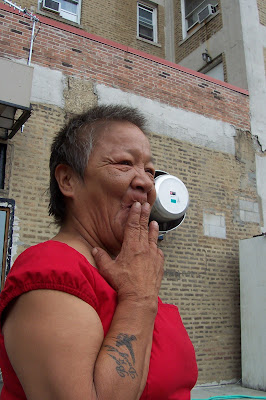How Cultural Awareness Affects Those Experiencing Homelessness
“The kind of hope that creates a willingness to position oneself in a hopeless place and be a witness, that allows one to believe in a better future, even in the face of abusive power. That kind of hope makes one strong.” — Bryan Stevenson
Whether people want to admit it or not: Homelessness, poverty, and the need for housing are severe problems in Auckland and Chicago. In response to what I've been noticing and experiencing, I've been writing a post about 7 Differences and 7 Similarities between the 2 cities I've lived and worked in. After realising that writing this is going to be a long journey, I've decided to post each "difference" and "similarity" as separate posts, as well.
Here's the 3rd Difference: whether someone lives in their vehicle, in a shelter, rides a train, or lives in a tent, it is essential to be aware of and honour who they are, and to respect each person's culture, race, and religion. This is the goal, but the truth is, different places live out what's ideal in vastly different ways.
Both cities are extremely diverse melting pots that pride themselves on being inclusive. Yet, the ongoing effects of colonisation, slavery, and white privilege, are blatantly evident in both places, proven by the race disparities in housing, homelessness, and the criminal justice system. With that being said, any government-funded social service agency is mandated to be non-discriminatory and to help anyone, regardless of race, ethnicity, gender, sexual orientation, and religious belief. In this section, I will highlight how each city has its own flavour and way of embracing cultural differences.
Chicago, with its beautiful Hispanic and Black flair, is very segregated. It was purposefully divided (redlined) by city planners and the government into neighbourhoods based on race and income. Each ward has its own unique flavour, with its culture, its trauma, its danger, and its beauty. Every Chicagoan is told and is highly aware of where they "can or cannot go!" Uptown (where I live) is an anomaly, as for decades it has always represented many cultures and socio-economic groups. Sadly, this beautifully diverse neighbourhood is tragically now becoming more segregated through the destructive power of politicians, money, and gentrifiers.
(I will address anti-homeless sentiments in another section: but for context, I wrote this to show how racism and anti-homeless sentiments are changing a diverse neighbourhood): Looters and Thieves: the art of destroying a neighbourhood through gentrification)
Tāmaki Makaurau, with its beautiful Māori and Pasifika flair, is more integrated. This city definitely struggles with its own version of segregation, but it seems to be defined by the landscape. The wealthy love to buy houses with more trees, better scenery, closer to the ocean, or higher up the hill. The lines of separation aren't as black and white as Chicago, as Auckland's relentless hills and valleys do highlight massive disparities, but it also means people of different cultures and income brackets do live in the same suburb or even on the same street.
Statistics in both cities show how a few races and ethnicities are sadly overrepresented in homelessness, housing insecurity and income disparity. These numbers reveal the devastating effects of colonisation, slavery, and white privilege. In acknowledging this inequality, I want to focus on a major difference between these 2 cities, how indigenous people are treated, acknowledged, respected, and honoured.
Within Aotearoa, social workers are trained in decolonising principles and Tikanga Māori, which means living out the inherited values and concepts practised from generation to generation. Every day in my mahi (work) there are concerted efforts to honour the Whenua (land), to speak and sing in Te Reo Māori (language), and to respect Māori protocols. So much has changed since my childhood and from this country's dark past, when the powers that be tried to snuff out the Māori language and customs. This past year in Waitākere has been a beautiful journey for me, being surrounded by people that seek to honour this city's beautiful indigenous people, and seeing Māori proudly living out their traditions without fear of retribution.
The USA stands in stark contrast! Native American land isn't honoured, their language isn't acknowledged or used, and their customs aren't respected. Not at all! It's sad, they know they've been forgotten and their voices have been snuffed out! When I walked with and assisted many living in Uptown Tent City, I saw their tears, listened to their traumatic stories, saw the effects of colonisation, and heard their lamentations. Peter, who slept in one of the tents, felt he couldn't live out his traditions, he felt his people were just viewed as mascots, his words echo in my head, speaking of why he doesn't vote or ask for help: "There's no hope, they (both sides) don't and have never given a damn about me or my people."
In this blog, I've tried to honour a few that could easily be forgotten: Rest In Peace Beverley and John (Chief), I pray I did you right. #NativeLivesMatter For us, it doesn't matter how neglectful or embracing a town may be, it does not matter the colour of someone's skin, it does not matter what country someone comes from, we should, on a personal level, honour, respect, and love each and every person we encounter.
My intent in writing these is to break barriers, create awareness, bring justice, and provide compassion for those who are some of society's most vulnerable members, for those experiencing homelessness.





Comments